Wishful thinking is a beautiful thing, but it's hard to argue with the facts. The Second Polish Republic was not a vestibule of civilization. More like a backwater. Single developed cities were separated by hundreds of kilometers of mud, backwardness and banditry. You could even say that our ancestors lived in the Wild East.
There were many similarities with the Wild West in Poland. Maybe there were no cowboys on the Vistula, but raids on trains - by all means! At that time, the railway was the basic means of transport. We had paved roads for medicine, as well as cars (the least in Europe per person), but PKP drove much faster and more comfortably than today. Industrialists, financiers and politicians traveled by rail. Almost all goods were also transported by rail. And that's what the robbers were counting on.
In October 1921, "Nowości Illustrowane" reported on two different train attacks: One of them took place between Nowy Sącz and Męciną, where a group of thugs armed with rifles attacked a moving freight train .
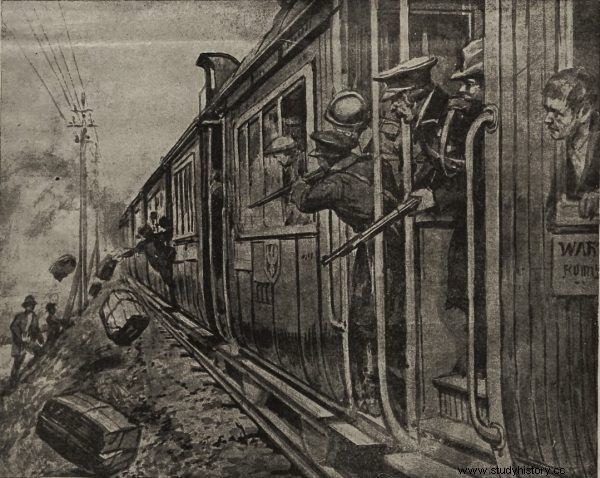
Train robbery… right outside Warsaw.
After getting inside the wagons, the thieves started throwing everything inside through the door - mainly sacks with flour, leather and tobacco. The engine driver braked sharply and the officers of the railway service attacked the robbers. Their rifles were useless - they were all arrested and put into custody. An even bolder attack took place right outside Warsaw:
It was done late at night, with the train stopped (…) with false signals. Terrorizing the train staff with the threat of using weapons, the bandits broke into the packing car and began throwing away travelers' luggage. From the Żyrardów station, where the train stopped, help came running, believing that an accident had occurred, so the villains fled, leaving the loot in their place.
A manhunt was organized immediately, but only some of the robbers were captured. Overall, both attacks - organized over the course of one week - were not particularly successful. However, the statistical average was different. In most cases, bandits were the top, and the tracks were thick with dead bodies.
Ruthless cowboys in Zagłębie Dąbrowskie
Apart from trains, carts and cars were also attacked. Driving between Polish cities was slow, uncomfortable, often through wild and desolate surroundings. No wonder not every shipment reached its destination. This was the case in Kresy, but even in the industrial, urbanized Dąbrowski Basin!
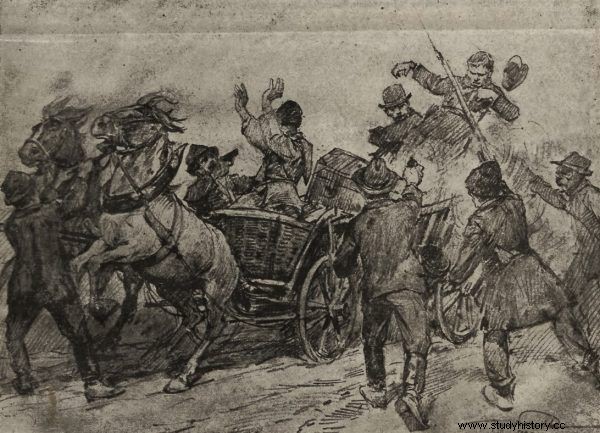
Like in the wild west. A daring attack on the cashier of a mine in Zagłębie Dąbrowskie.
The real attack of the century took place - also in October 1921 - on the road between Poręba and Zawiercie. At half-past five in the afternoon, a group of criminals armed with revolvers attacked a cart in which a cashier from a nearby mine was carrying cash with money.
The transport was carried out with the assistance of the police, but even this did not scare off the bandits who were eager to make easy money. They did not tell you to throw down your weapons or raise your hands up. They just shot: They injured the policeman who was sitting heavily in the cart. Then, after incapacitating the wounded, in a bestial manner they murdered first him, then the kaser and the coachman. They took all the armored cash (containing an undefined amount of cash) and, not disturbed by anyone, departed. The long-delayed pursuit did not bring any results.
Driving a car. Entertainment only for the brave
There were many similar cases. In 1936 near Ciechanów, bandits attacked two merchants on the road:they robbed one and shot the other as soon as he started calling for help.
In turn, near Wolsztyn, a masked perpetrator attacked the manager of a nearby dairy, Erich Böger, who was returning from the bank on a motorcycle, having taken 7,000 zlotys from him. Suddenly in the middle of the road:
He came across a wire that was dragged across the road, fell off his motorcycle and injured himself badly. The hidden criminal took advantage of this moment and shot, seriously wounding Böger, and then, after the money was stolen, he started to run away on his bike towards Nowa Wieś.
As befits the Wild East, we also had brave sheriffs, or rather - police inspectors. In mid-August 1921, bold Lviv burglars set a target for the apartment of Inspector Walenty Socha. When he returned home in the evening, he found the door open and disturbing murmurs came from inside. The inspector went inside and before he had time to look around, he had already been struck by the blows of three criminals.
A brave sheriff and his dog
Socha was covering himself with his hands and at the same time he started to retreat towards the bed, on the edge of which hung a holster with his service Browning revolver. The situation was hopeless:the bandits were already holding their weapons, they were ready to shoot him. The policeman did not have much time to take the initiative. And then a faithful wolfhound came to his aid - he attacked one of the robbers (he bit him right in the place where the back loses its noble name), confused the others and gave his master the time needed to grasp the weapon.
The bandits, seeing that the situation was starting to outgrow them, withdrew towards the hall.
When the call to stop failed, he fired Socha in the dark to intimidate the bandits who took refuge in the kitchen, where one of them fell to the ground. Seeing against the glass door that the other was aiming his revolver at it, he fired a second shot, followed by the clatter of the body falling to the floor.
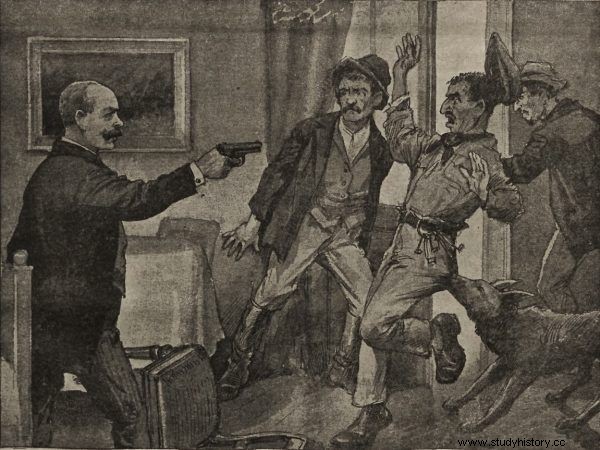
The dog saved his life. The amazing story of the sheriff from Lviv.
The third intruder took advantage of the confusion and made his way out to the balcony. Then he jumped down into the yard and an escape salvaged. None of the onlookers, alerted by the inspector's scream, stopped him. Also, despite the fact that a large crowd of people had already gathered in front of the tenement house, they did not dare to help the policeman.
It was only after a long moment that the senior constable Piotr Niewiadomski and the senior leader Antoni Talenta entered the apartment. Thanks to a vigorous pursuit, the fugitive was captured. All three robbers - one of whom sustained a severe gunshot wound - were arrested. On the other hand, the inspector admitted to the press: "I owe it to my dog!" .
You cannot feel safe in your own home
Enough of these western analogies. In general, Poland was swarming with greedy people and quite a few of them were ready to make a fortune over the corpses. Newspapers reported daily new robbery murders. They were so common that they rarely found their way to any of the front pages.
They simply constituted the natural color of life in the Second Polish Republic. In 1937, the Jewish "Nowy Głos" wrote about an attack on a valued Lviv confectioner, Daniel Steckow, who was killed by burglars by inflicting a series of hard blows on him with a marble slab.
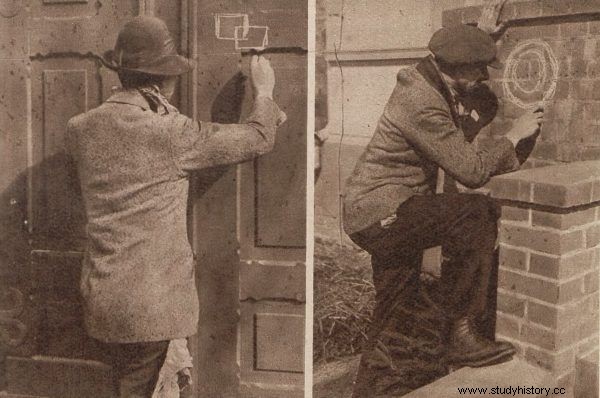
The burglar at the robot marks the location of the next jump in the "Secret Detective" photo.
In 1931, the "Secret Detective" reported an attack on a war invalid in order to withdraw his pension. Anyway, the robbery was completely unsuccessful. The crime took place in Mała Dąbrówka in Silesia. The victim, Józef Mateja, received the allowance every week on Saturday, but this time she did not manage to do it. Perpetrators - Paweł Sycha and Franciszek Mazurek:
after killing the invalid, they found, to their great disappointment, only 20 cents worth of cigarettes. As it turned out, Mateja did not take his pension that day, because he came after the cash desk was closed. The murderers, unable to otherwise vent their fury, tortured the corpse of the old man. The police tracked them down and arrested them.
To kill, just not to pay off the debt
Small lenders could not feel safe either. In two decades, stories like those from the famous movie "The Debt" were something completely normal. For example, "Nowiny Codzienne" informed in 1933 about the trial of three murderers:Marcin Jasiński, Czesława Wołoszyn and Róża Norberciak. A few months earlier, they had committed a crime together of strangling and drowning their creditor Adam Kozera.
They owed him only PLN 130 in total. Converted into today's zloty - PLN 430 per head. Really little for such a radical debt reduction action ... Jasiński was sentenced to 15 years in prison. Wołoszyn and Norberciak out of ten. Probably just because they were women.
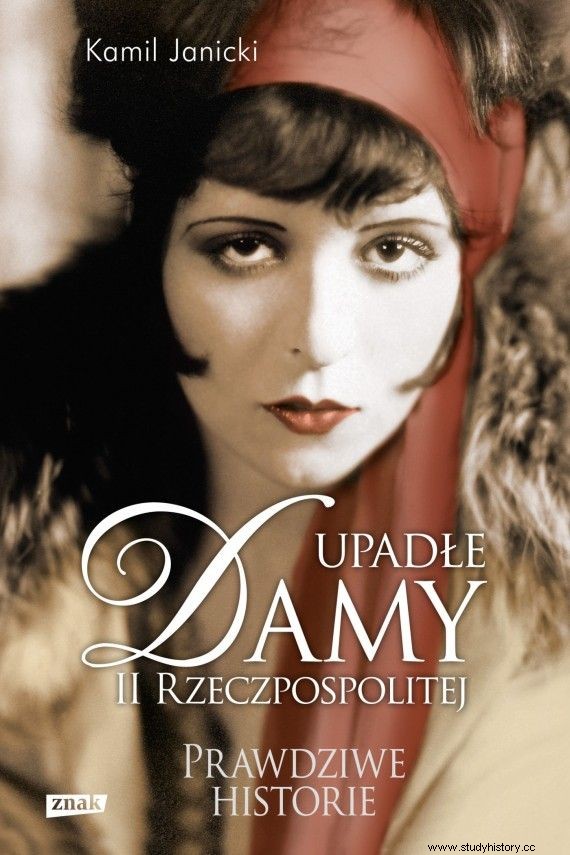
Ruthless, decisive and deadly. The most famous criminals of pre-war Poland in the book by Kamil Janicki "Fallen ladies of the Second Republic". Buy with a discount on empik.com.
It is also worth mentioning the case from Lviv, described in February 1921 by "Nowości Illustrowane". It perfectly shows how little one could lose in former Poland.
My mother helped me kill
There was an old woman in Lviv, Mrs. Wernerowa. She had Amelia Burska and her daughter Malwina as neighbors. Wernerowa became more and more ailing with age, so from time to time she shyly asked Malwina for a little help at home. On the critical day, she asked her to light the stove, and she herself went to bed and started talking. About the fact that she feels very bad, that she is expecting her death, that she bequeathed all her valuables to the Franciscan order ... Valuables ?! That one word awakened the beast in my neighbor.
Malwina took a criminal intent at this moment. She called her mother and hit the lying old woman in the head with an ax, then closed her mouth with her hand to prevent the dying woman from wheezing. Mother killed the victim.
The women hid the jewelery they had taken from the apartment in the attic. They took larger items to their relative in Lechówka near Lviv. The police found their trail without any problems, and both accused gave contradictory statements.
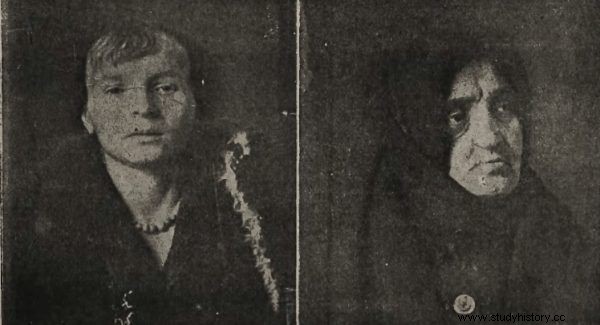
Malwina and Aniela Burskie. Your mother will always help you!
Pushed to the wall, Malwina threw herself to the feet (...) [the policeman] who was conducting the investigation and testified in detail how she had committed the crime. From under the log in the basement she drew the still bloodied ax, and from the attic hidden valuables of the deceased - the weekly reported.
The mother, who so willingly helped in the crime, did not confess to anything. She stated that she did not know about any of the murders, and apparently Malwina had committed it herself. However, the court did not believe such translations. Both accused were sentenced to death.
Sources:
The article is based on source materials and literature collected during the work on the book "Upadłe damy II Rzeczpospolitej". You can buy the book with a discount at empik.com .
